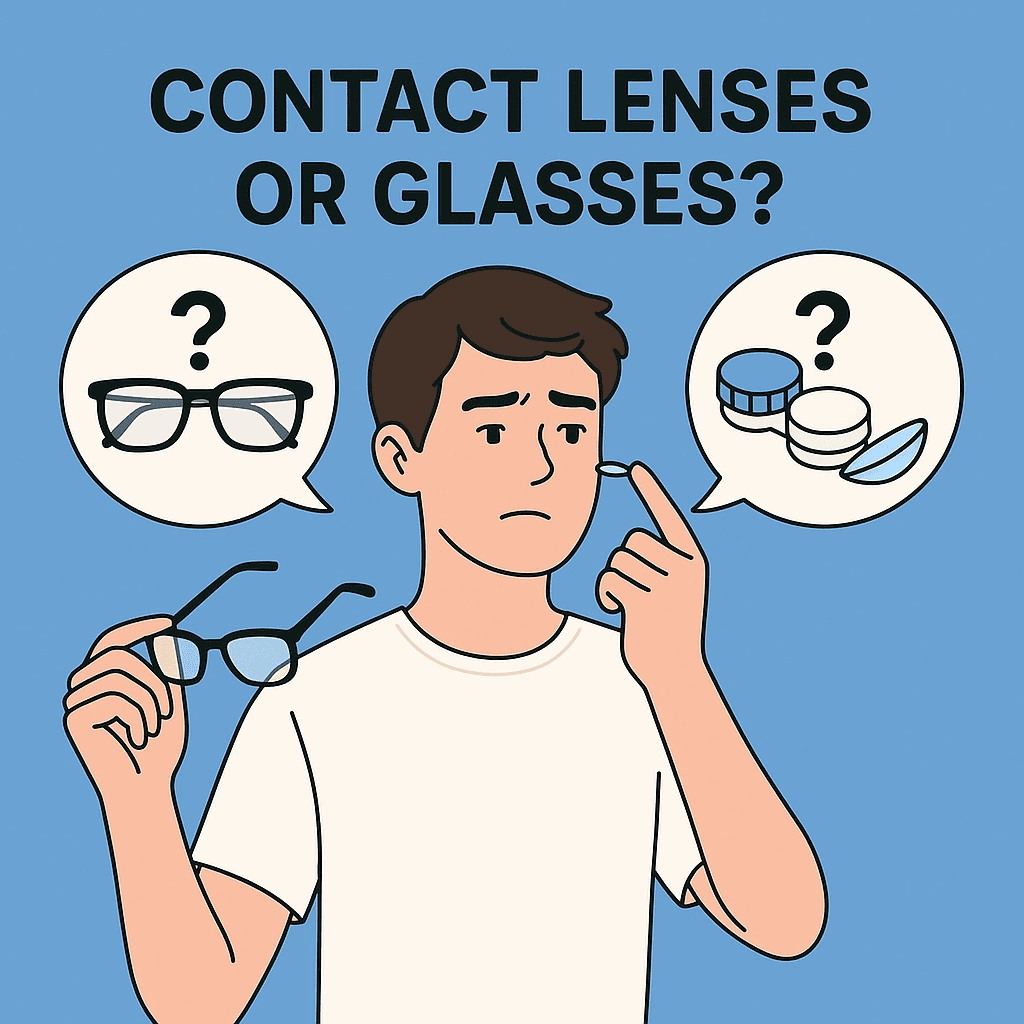Contact lenses and glasses both serve the same purpose—correcting vision—but the two options come with distinct advantages and drawbacks. Understanding the disadvantages of contact lenses over spectacles is key to making an informed decision. This article delves into the key downsides of contact lenses, comparing them with glasses, to help you determine which option is best for you or your customers.

1. What Are the Main Disadvantages of Contact Lenses?
Contact lenses may seem like a modern, convenient solution to correcting vision, but there are notable disadvantages. Here’s the kicker: when lenses aren’t properly maintained, they can lead to a range of eye health issues. Contact lenses can cause irritation, dryness, and in extreme cases, infections that can harm your eyesight.
The most common issues that arise with contact lenses are dryness and discomfort, especially when worn for long periods. You might be wondering how this happens—lenses deprive the cornea of oxygen, and without proper hydration, the eyes can become irritated. Contacts can also lead to infections, particularly if they’re not cleaned properly or if they’re worn past their recommended time.
Additionally, improper handling can cause scratches on the lens, leading to visual distortion and eye strain. What’s the real story? Contact lenses require constant care and attention to avoid these problems.
Moreover, contact lenses aren’t a one-size-fits-all solution. Here’s the deal: they can be unsuitable for individuals with certain eye conditions, such as severe dry eye or astigmatism. Those with allergies may also struggle to wear them comfortably during high pollen seasons.
| Disadvantage | Explanation |
|---|---|
| Dryness and Discomfort | Lenses deprive cornea of oxygen and can irritate eyes |
| Risk of Infection | Improper cleaning can lead to eye infections |
| Unsuited for Certain Conditions | Not ideal for people with dry eyes or astigmatism |
2. How Do Contact Lenses Compare to Glasses in Terms of Comfort?
When it comes to comfort, glasses have the upper hand for most people. What’s the catch with contact lenses? While contacts may seem like the more comfortable option at first glance, they can become irritating over time. Glasses sit on the face without making direct contact with your eyes, while contact lenses sit directly on the cornea, which can lead to discomfort.
In particular, this is where it gets interesting: contact lenses can cause dryness, especially if you’re wearing them for extended hours. But here’s the kicker—contact lenses must be hydrated regularly to avoid irritation, and this can be tough to maintain in dry environments. For those who wear glasses, on the other hand, the only discomfort comes from the occasional slipping down the nose.
For individuals with active lifestyles, contact lenses may also pose an issue. You might be wondering: “What about during physical activity?” Contacts can easily dry out or fall out, especially if you sweat heavily or are exposed to windy conditions. In contrast, glasses stay securely on your face without the risk of falling off.
| Comfort Factor | Glasses | Contact Lenses |
|---|---|---|
| Comfort over Time | No direct eye contact | Can cause dryness and discomfort |
| Suitability for Active Lifestyles | Stay in place during activities | Can fall out or dry out |
| Impact of Environment | No effect | Sensitive to dry or windy conditions |
3. What Are the Potential Risks of Wearing Contact Lenses?
The risks associated with wearing contact lenses are significant. This is where it gets serious: not cleaning them properly can result in eye infections such as conjunctivitis or even corneal ulcers, which can lead to vision loss if not treated promptly. If you wear lenses for too long, they can lead to reduced oxygen supply to the cornea, causing tissue damage.
Even with proper care, contact lenses can cause problems if they’re not fitted correctly. Here’s the deal: lenses that are too tight or loose can cause scratches on the eye, leading to irritation, scarring, and vision issues.
Furthermore, if lenses aren’t removed as per the recommended time frame, they can lead to dryness and discomfort. What’s the real story? The longer you wear them, the greater the chances of complications such as eye infections or even the development of blood vessels in the cornea.
| Risk | Explanation |
|---|---|
| Eye Infections | Improper cleaning or prolonged wear can cause infections |
| Reduced Oxygen Supply | Wearing contacts for too long can harm the cornea |
| Scratches or Scarring | Incorrect lens fit can lead to eye damage |
4. Are Contact Lenses More Expensive Than Glasses?
When comparing contact lenses to glasses in terms of cost, it’s clear that contact lenses can be more expensive in the long run. What’s the cost breakdown? While glasses typically require a one-time purchase of frames and lenses, contact lenses require ongoing purchases of cleaning solutions, replacement lenses, and additional accessories.
Moreover, there are various types of contact lenses—some are daily, some are bi-weekly, and others are monthly. Here’s the kicker: depending on the type, you’ll need to replace them frequently, which adds to the overall cost.
Also, many individuals require multiple pairs of glasses for different situations, such as reading glasses, prescription sunglasses, and regular glasses. However, the total cost for glasses may still be lower when considering the long-term expense of contacts.
| Expense Type | Glasses | Contact Lenses |
|---|---|---|
| Initial Cost | One-time cost for frames and lenses | Ongoing costs for cleaning and replacements |
| Replacement | Infrequent | Regular replacement every few months |
| Total Long-Term Cost | Relatively lower | Higher due to ongoing expenses |
5. How Do Contact Lenses Affect Vision Quality?
Contact lenses offer clear and precise vision but they come with certain caveats. What’s the real story? While they provide an unobstructed field of vision, they can also cause visual distortion if they don’t fit properly.
For individuals with astigmatism, the prescription for contact lenses may be harder to get right compared to glasses, leading to blurry vision. But here’s the kicker: not all people can tolerate contact lenses, and even with the correct prescription, the vision quality can still be impacted due to dryness, lens displacement, or poor fitting.
In comparison, glasses have a consistent level of clarity as long as the prescription is correct. This is where it gets interesting: glasses don’t come with the risk of lens displacement, making them a more reliable option for consistent vision quality.
| Vision Quality | Glasses | Contact Lenses |
|---|---|---|
| Consistency | Consistent vision | Can fluctuate due to lens fit or dryness |
| Ideal for Astigmatism | Easier to fit | More challenging to fit properly |
| Risk of Distortion | Rare | More common if lenses are not fitted properly |
6. What Are the Maintenance Requirements for Contact Lenses?
Unlike glasses, contact lenses require regular maintenance to stay clean and safe for use. This is where it gets serious: failing to clean your lenses properly can lead to infections and other health problems. Cleaning solutions and cases must be changed regularly to maintain hygiene.
For those who wear contacts, you might be wondering: “What’s the most common mistake people make?” Many users forget to wash their hands before handling lenses, which introduces bacteria. Additionally, not replacing the lens case frequently enough can cause bacterial growth.
In contrast, glasses only require occasional cleaning, and the maintenance involves nothing more than wiping the lenses with a soft cloth. Here’s the kicker: glasses don’t need daily cleaning solutions, and their maintenance is far less complicated.
| Maintenance | Glasses | Contact Lenses |
|---|---|---|
| Cleaning Frequency | Occasional | Daily cleaning required |
| Supplies Needed | Microfiber cloth | Cleaning solution, lens case |
| Risk of Infection | Low risk | High risk if not cleaned properly |
7. Are Contact Lenses Suitable for Everyone?
Contact lenses aren’t ideal for everyone, and some people may face challenges when wearing them. What’s the real story? Those with certain eye conditions, such as dry eye syndrome or severe astigmatism, may find it difficult to wear contact lenses comfortably.
Furthermore, some people have sensitive eyes that react poorly to contact lenses, leading to discomfort and redness. But here’s the kicker: contact lenses require a healthy cornea, and individuals with certain health conditions, like autoimmune disorders, may not be suitable candidates for wearing them.
| Suitability | Glasses | Contact Lenses |
|---|---|---|
| Dry Eyes | Can wear comfortably | May cause discomfort |
| Astigmatism | Easier to correct | More challenging to fit |
| Health Conditions | No risk | May not be suitable for all users |
8. How Do Contact Lenses Affect Your Eyes During Activities?
Contact lenses can be beneficial during physical activities, offering an unobstructed field of vision. But here’s the kicker: during strenuous physical activities, such as running or playing sports, contacts can dry out or even fall out, which can be highly inconvenient and uncomfortable.
For those involved in water sports, contact lenses can also pose a risk—especially if they come into contact with dirty water or chlorine. You might be wondering: “What about swimming with contacts?” It’s generally not advised to wear contacts while swimming because of the risk of infections and irritation.
| Activity Type | Glasses | Contact Lenses |
|---|---|---|
| Sports | May fall off or fog up | Can fall out, dry out, or cause irritation |
| Swimming | No effect | Not recommended due to risk of infection |
| Physical Exercise | Can slide down or fog up | Can cause discomfort or dry eyes |
9. Can Wearing Contact Lenses Lead to Dry Eyes?
Dry eyes are a common problem for contact lens wearers. What’s the catch? Contact lenses block the natural moisture that the eye needs, which can lead to discomfort, particularly after long periods of wear.
You might be wondering: “What can I do about it?” There are hydrating drops available to alleviate dryness, but if the problem persists, it could be a sign that the lenses are not suitable for your eyes.
In contrast, glasses do not have this issue, as they do not interfere with the natural moisture of your eyes. Here’s the kicker: while glasses may cause some fogging during exercise or extreme temperatures, they don’t cause dryness or irritation the way contacts can.
| Dryness Factor | Glasses | Contact Lenses |
|---|---|---|
| Dryness Risk | No risk | High risk due to lens materials |
| Solutions | Minimal | Requires lubricating drops |
| Frequency of Issue | Rare | Common with prolonged wear |
10. Are There Any Long-Term Health Concerns with Wearing Contact Lenses?
There are several long-term health concerns associated with wearing contact lenses, especially if they are not properly maintained. What’s the real story? Over time, contact lenses can cause a reduction in the oxygen flow to the cornea, leading to corneal hypoxia, a condition that can result in permanent vision problems.
Wearing contact lenses for long periods also increases the risk of developing corneal ulcers, which are painful and can lead to vision loss if not treated promptly. This is where it gets serious: improper cleaning can introduce harmful bacteria into the eyes, leading to serious infections and even blindness.
| Long-Term Health Risks | Glasses | Contact Lenses |
|---|---|---|
| Oxygen Deprivation | No effect | Can lead to corneal hypoxia |
| Infections | Low risk | High risk if not cleaned properly |
| Vision Issues | No risk | Can lead to permanent damage |
11. Can Contact Lenses Be Worn During Sleep?
Sleeping with contact lenses in can be harmful to eye health. What’s the real story? Contact lenses deprive the eyes of oxygen when worn overnight, which can lead to irritation, dryness, and long-term health issues.
But here’s the kicker: there are special lenses designed for overnight wear, but they still require proper care to avoid complications. If you forget to remove your contacts before sleeping, it can cause significant damage to your cornea.
| Sleeping with Lenses | Glasses | Contact Lenses |
|---|---|---|
| Risk of Damage | No risk | Can cause dry eyes and corneal damage |
| Special Lenses | Not applicable | Special lenses available, but with risks |
| Regular Removal | No need for removal | Must be removed to avoid damage |
12. How Do Contact Lenses Affect Your Appearance?
Contact lenses can enhance your appearance by allowing your face to remain unobstructed by glasses. What’s the catch? Some people might not feel comfortable without their glasses, as they are used to wearing them.
Here’s the kicker: contact lenses offer the freedom to wear sunglasses and participate in activities that glasses might inhibit. For those with more serious eye issues, glasses may be a preferred choice for enhancing their overall look.
| Appearance Factor | Glasses | Contact Lenses |
|---|---|---|
| Visual Appeal | May alter facial appearance | Provides unobstructed view |
| Confidence | May feel more comfortable with glasses | Some find them liberating |
| Lifestyle Choices | Limits options for sunglasses | Can wear any type of sunglasses |
13. Are There Alternatives to Traditional Contact Lenses and Glasses?
If you’re considering alternatives to contact lenses and glasses, there are a few options available. What’s the real story? Laser surgery, such as LASIK, can correct vision issues permanently, offering a one-time solution to eye problems.
But here’s the kicker: LASIK isn’t suitable for everyone. Those with thin corneas or certain eye conditions may not be eligible for surgery. Other options include hybrid lenses and orthokeratology, which reshape the cornea temporarily to improve vision without surgery.
| Alternative Options | Glasses | Contact Lenses |
|---|---|---|
| LASIK Surgery | Requires corrective lenses post-surgery | Can eliminate need for contacts |
| Hybrid Lenses | Not available | Can offer better comfort than standard lenses |
| Orthokeratology | Not applicable | Temporary solution for vision correction |
14. Can Contact Lenses Be Worn During Illness or Allergy Season?
Contact lenses can become uncomfortable during illness or allergy season. What’s the catch? Allergies can cause eye irritation, and when combined with the use of contact lenses, it can exacerbate dryness and discomfort.
You might be wondering: “Can I still wear lenses when I have a cold?” While it’s technically possible, you may need to use lubricating drops to reduce discomfort. In cases of severe allergies or a cold, it’s best to switch to glasses temporarily.
| Illness or Allergy Impact | Glasses | Contact Lenses |
|---|---|---|
| Allergy Symptoms | No impact | Can exacerbate irritation |
| Cold or Flu | Can be worn comfortably | May cause discomfort and dryness |
| Best Practice | Ideal for comfort | Best to switch to glasses |
15. What Are the Best Practices for Minimizing the Disadvantages of Contact Lenses? (Conclusion)
In conclusion, contact lenses are a practical choice for many, but they come with their own set of challenges. What’s the final take? By practicing good hygiene, adhering to recommended wear schedules, and scheduling regular eye exams, many of the disadvantages can be minimized. If you are experiencing consistent discomfort or health issues, it might be time to reconsider your options.
To maximize comfort and health, always follow proper maintenance routines and consult your optometrist regularly.
| Best Practices | Glasses | Contact Lenses |
|---|---|---|
| Regular Maintenance | Low maintenance | Requires daily cleaning and care |
| Comfort and Health | No risk of infection or dryness | Requires attention to prevent irritation and infection |
| Eye Health | Minimal concern | Regular check-ups and proper wear time are necessary |
FAQ Section
Q1: What is the main disadvantage of contact lenses?
Contact lenses can lead to eye infections, irritation, and discomfort if not properly maintained. Overuse and poor hygiene can also lead to more serious issues like dry eyes and reduced oxygen to the cornea.
Q2: How do contact lenses work?
Contact lenses sit directly on the eye and bend light to help you see more clearly, offering a wider field of vision compared to glasses.
Q3: What should I do if my contact lenses feel dry?
You can use lubricating eye drops specifically for contacts, reduce the wear time, and ensure that your lenses are cleaned and stored properly.
Q4: Can contact lenses be worn for a whole day?
It’s best to follow your optometrist’s recommendation for wear time, as keeping contacts in for extended periods can cause dryness and irritation, and increase the risk of eye infections.
Q5: Are contact lenses more expensive than glasses?
While the initial cost of glasses may be lower, the ongoing costs of contact lenses, including cleaning solutions and replacements, can add up over time.

